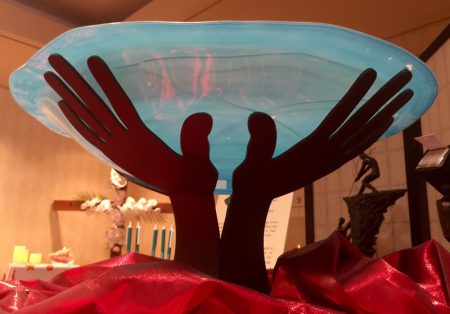The African bishops’ public condemnation of a schismatic effort in their regions is a portent of a stronger, regional public witness by United Methodist bishops—and more sleeping giants are awakening this November 2022.

African Bishops showing how it is done
Longtime readers know my patience is short when it comes to waiting for bishops to speak strongly against the Wesleyan Covenant Association, especially in recent months as the WCA (and their supporters) have upped their rhetoric. The changeover of their leadership to Florida Man has certainly moved the WCA to a less strategic and more flagrant violator of United Methodist norms. But all the while, one would rarely see action or rhetoric by bishops against these violations, instead relying on unity and big-tent rhetoric.
But finally, the cracks in the “Methodist nice” façade have begun to spread. In remarks at the Council of Bishops by Bishop Thomas Bickerton and in comments by active bishops such as Bishop Tracy S. Malone, it seems bishops have started to be open about the harm being done by the WCA as it pillages the UMC to create the Global Methodist Church.
This month, the dam broke.
In September 2022, a joint statement by the Colleges of Bishops in Africa, calls out the WCA and their affiliated organization the Africa Initiative. Quote:
“We, the Bishops of The United Methodist Church in Africa, declare the following: We will dissociate from any activities of the Africa Initiative and will not allow any activities of the Africa Initiative in our areas. We will not allow or entertain any activities of the Wesleyan Covenant Association who are wrongly influencing God’s people in our areas. We will not tolerate anyone giving false information about The United Methodist Church in our areas.
Amazing. But there is more yet to come.
A Portent of things to come
The Council of Bishops, an international body, does seem slow to speak on issues of public witness. So how could a group of Bishops issue such a strongly-worded statement? Here’s how: They wrote it as their region. Instead of the 13 signing Bishops persuading the 60+ active members of the Council of Bishops to write a statement, they wrote their own as their own regional Colleges of Bishops.
This is a powerful approach because with regional authority comes more unity of action. One can imagine that the European Bishops could write a powerful statement on refugees from the Ukraine war–but what if they had to write it in conjunction with conservative bishops from North American border states that were more anti-immigrant? Would be it as powerful? Or would it be toned-down?
Regional diversity gives the United Methodist Church its strength, and we should do more to encourage it.

Regions Speaking with Clarity in Mission and Purpose
When we celebrate the leadership of the African bishops on matters close to their home, we affirm the value of regional diversity:
- We should want Germany and Europe and Africa to frame migrant crises for the United Methodist Church because they are on the front lines and have voices of experience. We don’t want them to be silenced by the anti-immigrant voices in the United States.
- We should want Africa to frame the global terrorism concerns for the United Methodist Church because they are on the front lines and have voices of experience. We don’t want them to be silenced by hawkish militant voices in the United States.
- We should want Asian and African voices to frame the human trafficking concerns for the United Methodist Church because they are on the front lines and have voices of experience. We don’t want them to be silenced by their customers in the United States (sorry, it’s true ).
- And we should want the regions that affirm LGBTQ+ persons to frame the calls for full inclusion for the United Methodist Church. United Methodists who live in more supportive regions where LGBTQ+ persons live more openly have seen fuller expressions of human sexuality, and that gives a more holistic sense of their human condition when we reflect on human sexuality through biblical and theological study.

November wave coming, bringing the potential for LGBTQ+ inclusion
At the end of the day, even if every GMC-leaning congregation left The UMC, we would still have an anti-gay Church until the 2024 or 2028 General Conferences can finally change our polity. But what if I told you things could change in January 2023?
Even as the United States braces for elections in November 2022, the week before is the jurisdictional conferences in the United States where the American regions will select new bishops who would begin their tenure in January 2023.
Given the high number of chosen and mandatory retirements (and open positions even now), plus the conventional wisdom that progressives and centrist coalitions have a majority in all five regions of America, it is expected to be a progressive and centrist wave of both bishops and jurisdictional committee assignments, leading to a majority progressive or centrist colleges of bishops even in the South.
And here’s what that means: if the five regions of America publicly state their refusal to enforce LGBTQ+ exclusion, their refusal to follow an unjust law that causes harm, then LGBTQ+ inclusion can come to the United Methodists in the USA overnight. Even the global Council of Bishops wouldn’t be able to override the regional colleges given the majority seats these regions would hold.
Yes, I know, in practice, not in polity. We aren’t there yet. But it’s better to put into practice our hope for 2024 or 2028 than to merely wait until we can. Let’s make one necessary change now and live into it and see if it’s the end of the world or not.
More with Less
Even as United Methodist loses people and property to the Global Methodist Church, regional authority is actually the United Methodist future that traditionalists most fear because it allows local mission and context to augment the hegemony of global bodies.
- Traditionalists know if regions commit to more action and unity around social questions that they no longer are critiquing faceless “the man” global bodies but rather are criticizing local leadership who have faces and connections and are not as easily intimidated, such as how Bishop Sue Haupert-Johnson stood up to the megachurch Mt. Bethel and how Bishop Ken Carter is weathering a 106 church suit.
- Outside organizations like the Institute for Religion and Democracy, who have long intimidated and attacked public witness by the global bodies of United Methodism, will have a harder time manipulating 8 regions instead of one global body, and continued failures to achieve goals so will dry up their funding.
- Even traditionalist bishops still remaining in The UMC (the most anti-gay American ones are retiring this year, thankfully) won’t be able to keep the regions from speaking clearly to their context. For example, the African bishops’ statement included all but one active bishop (Bishop John Wesley Yohanna, who has been accused of arresting pro-UMC pastors in Nigeria). Even a bishop in Virginia wouldn’t stop the mighty SEJ from speaking up.
The election of a wave of progressive and inclusive bishops who jointly refuse to enforce an unjust law that does harm can transform The United Methodist Church. A joint statement of that magnitude will instantly create inclusion by practice in 2023, stepping towards full inclusion by polity in 2024 or 2028. And our regions can sort out what it looks like in that practice as appropriate.
May it become so. May our delegations to jurisdictional conferences recognize the stakes and vote in a fully inclusive slate of bishops that will be bold in naming the sin of LGBTQ+ exclusion and owning their power to begin to stop it in The United Methodist Church.
Your Turn
Thoughts?
Thanks for reading, commenting, subscribing, and sharing on social media.



From your keyboard to God’s ears!
Then hopefully we can address the problem of our bloated mid-twentieth-century bureaucracy, the weight of which, out local churches can no longer bear.
This is the beginning of the end, finally, of the caustic and pointless disunity in the UMC that had its most recent institutionalization in the ill-conceived reunion of North and South Methodism in 1939. The theological and social divisions had been there from the very beginning of the UMC, as evidenced by the continual struggle required of Francis Asbury to keep it together. The dispute over slavery heightened the divide, as did the emergence of Fundamentalism (embraced by the southern branch) and Social Gospel (embraced by the northern branch). It’s high time these two unreconcilable religions went their own separate ways. The statement of the African Bishops is a breath of fresh air in its honest recognition of irreconcilable difference.
Are suggesting Southern Progressives don’t exist? Or that bigotry is isolated in the South and that other regions don’t battle it?
Love this! Thank you! May it be so.
This article is full of hate.
What, specifically, is hateful?
Not unless you brought hate to your reading of it.
AMEN — Let’s get our act together and DO THIS!
Thank you, Jeremy!
We know, of course, that the church in Africa is not monolith. And we can make a fairly well-informed guess that the African church is more traditional than most of the U.S churches.
But good for them for publicly stating that they will no longer be pawns in this exercise, treated as nothing more than voices and votes to be traded in the worst tradition of exploitation and colonialism, and that there are consequences for doing so.
And thank you for explaining in a clear and practical way how regionalization can work.
I am not super surprised by the African Bishops’ statement. While many of them are of one accord with the WCA with regard to human sexuality, they are well aware that there is even more racism and paternalism among white conservatives than there is among the moderate and progressive wings of the UMC. Their attitude has much in common with the Black church here in the states–African American evangelicals know the cesspool of racism that is the white evangelical church in America, and that is more critical to them than their agreement with white evangelicals on some social issues.
Really distressing that we have reached the point where there is excitement about electing MORE Bishops who will ignore the Discipline in practice. We can never move forward if all we have is renegades ignoring our polity. If the position is good, and I think it is, then work to change the Discipline in 2024.
There is something to be said about the virtue of disobedience to evil laws.
The problem, of course, is who gets to decide which laws are ‘evil’. If everyone is their own judge, then why have laws at all?
Maybe we shouldn’t. I’m of the opinion that the BoD should be regarded as important primarilly for laying out the structures of United Methodism, and that wherever it goes into social issues, it should be regarded the same as the Social Principles- as ‘a call to all members of The United Methodist Church to a prayerful, studied dialogue of faith and practice’.
I like the regional approach as it allows each region and jurisdiction to have its own culture. I also think holding firm to 2553 will help unhappy congregations to leave. Now…how can we make ordination less arduous and on par with our African conferences?
A great incisive and insightful post. You have described the future of United Methodist politics accurately. Thank you.
As you have pointed out how individual bishops are now beginning to speak truth to power, I am reminded that throughout the history of the United States, The Methodist Church has generally reflected the values and politics of the nation and vice versa. I am hopeful that individual truth tellers within church leadership will be reflected by the emergence of more truth tellers in the political sphere. Fortunately, we are beginning to see this happen now. A culture shift is taking place.
Now that you are rejoicing over the African College of Bishop’s statement because they have decided to work towards legalizing sin in the UMC, even though, at moment they may claim that as a region LBGTQ+ will not be practiced in their region but I can see very clearly that sooner or later the regionalization campaign will melt up just few years to come. In fact each region practicing her Christianity in the UMC within its context and culture is just a mere say. American UMC who missed the road has nothing to offer than head knowledge. Your pride has landed UMC into dirty politics. Now that you have succeeded in winning the hearts of the African Bishops and by November you are sure of electing gay pastors to be Bishops, changing the language of the Book of Discipline will not be a problem any longer. You owned the UMC, go ahead with the open sin legalization agenda and policy. Jesus Christ is watching. May be
the next thing to do by you is the changing of the Holy Bible by removing some passages from. Oh…..my God have mercy on your Church the UMC. You are rejoicing but I am shading tears because the Church is becoming worldly and the world is becoming churchly. What a shame!
Open sin legalization? What do you mean by that?
Sour grapes makes garbled posts.
Missing from this…..any biblical scripture. Am I missing something that John Wesley preached from the bible? He based his faith and gave our God the Father credit for what he knew. Erasing the biblical scriptures pretty much nullifies the history of Methodists. Did Wesley say, “Oh, if you ever find the bible to be in error, disregard what I have worked towards”. Wesley worked hard to show that the sinners, the down trodden were not overlooked and made sure that they received the gospel. Did Wesley preach to those folks, oh just keep on doing what you are doing cause God is not real, hell is not real and all you have to do is love and include everyone. Keep on disobeying scripture. Grace is bountiful. God’s peace be to you. Grace to you. Enlightenment to you. Jesus saves and there will be people in hell who know this. Know the saving grace. Not grace offered from man. Huge difference.
Serious question: how many UMC pastors have you seen preach that God is not real?
There is a huge difference between thinking a passage has been interpreted incorrectly and thinking the passage itself is incorrect. Learn that difference- and learn to recognize the difference between what is written and what is assumed.
I’m glad to read this debate. It is important. My God loves all. If there is any judgement then God will dispense that. I will choose to love and respect my fellow human beings regardless of waring beliefs. There is enough judgement in this world. I choose to show love and acceptance that I feel Christ leads me to do.